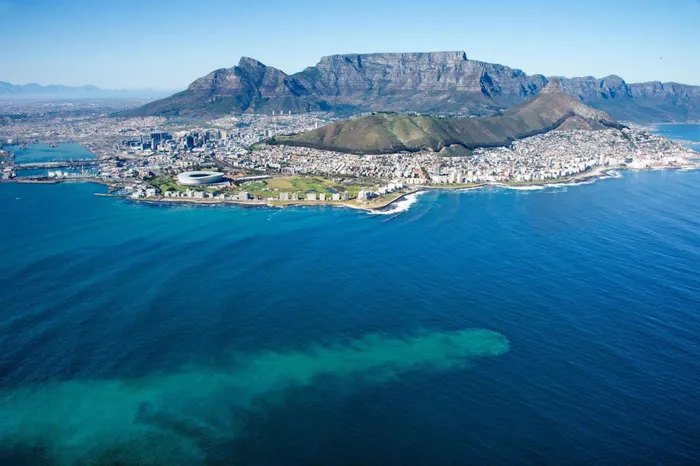Experts questions Blue Flag water testing

A 2014 aerial picture of a plume of effluent as seen from the sky by marine conservation photographer Jean Tresfon.

Despite the sewage spills that have occurred over the last two years, the City of Cape Town is continuing its effort to maintain Blue Flag status at Atlantic seaboard beaches.
The Atlantic Sun has twice reported on pollution on the seaboard: “Camps Bay marine outfall causes a stink”, (February 11, 2022) and “Sewage matters under spotlight”, (March 16, 2023).
Councillor Patricia Van der Ross, the mayoral committee member for community services and health, believes that the R5 million investment with the Wildlife and Environment Society of South Africa over a 10-year period is feasible.
“The agreement aims to minimise the onerous annual administrative process that comes with paying a sole provider (WESSA). This agreement also further cements the City of Cape Town’s ongoing commitment to the programme with the aim to provide world class amenities. It should also be noted that while the agreement makes provision for up to 15 Full Status Blue Flag applications, the City will only pay application fees for the beaches we actually apply for,” said Ms Van der Ross.
Tevya Lotriet, Senior Sustainability Programme Manager for WESSA, says the annual application payment to WESSA indicates the City’s commitment to promote sustainable management at their beaches.
“To achieve the International Blue Flag status for beaches, as many as 33 different criteria spanning over four themes of coastal management must be met and maintained: These are water quality, environmental education and information, environmental management, and safety and services. Essentially a Blue Flag beach must be clean, ablutions and surrounding areas well maintained, bathing water must be safe for swimming so regular testing is required, appropriate safety measures should be in place and the beach should be accessible for all,” she said.
She adds that the frequency of testing varies across different municipalities, based on the season length, but as a minimum for each sampling point, there must be no more than 31 days between any two water samples during the Blue Flag season.
“The City of Cape Town over the last season sampled weekly at Camps Bay for most of the submitted samples. There were only two samples out of 10 which had a two-week sample gap, the other eight samples only had a one-week sample gap. WESSA does not accept any internal samples taken by municipalities. Only an independent laboratory can carry out the analysis of the bathing water samples,” Ms Lotriet said.
Professor Leslie Petrik, group leader of Environmental and Nano Sciences at UWC, says that the testing does not inform beachgoers on a daily basis and therefore does not safeguard the public.
“The Blue flag status is only for a portion of the year and for a portion of the beach. There should be more frequent testing at the beaches and it’s a good thing that WESSA is independent but I think the Blue Flag status is used as a marketing gimmick to promote tourism, I don’t think it offers a believable model for water safety,” said Professor Petrik.
WESSA can only hold the municipality accountable during the Blue Flag season according to Ms Lotriet.
“For the water quality evaluation of an applicant beach, the Blue Flag Programme requires 95th percentile compliance with the E.coli & Intestinal Enterococci limit values. This is in accordance with the EU Bathing Water Directive (2006) as well as the recommendation of the World Health Organisation. The percentile has to be calculated for each parameter and also met for each parameter. For example, if the 95th percentile is below the limit values for E.coli but not for Intestinal Enterococci then the beach cannot be awarded with the Blue Flag,” she said.
Like Professor Petrik, Dr Jo Barnes, senior lecturer emeritus in the Faculty of Medicine and Health Sciences at Stellenbosch University, is also concerned about the testing.
“This lax sampling coverage with gaping holes in it, makes it virtually impossible to fail environmental safety standards. The lax standards and the ‘open’ arrangements for surveillance makes the Blue Flag certification system more of a public relations or advertising exercise, but it is sold as a health protection endorsement that it is not designed to be,” said Dr Barnes.
Ms Lotriet says they do not accept any internal samples taken by municipalities and only an independent laboratory can carry out the analysis of the bathing water samples.
“WESSA is fully transparent about the water quality results and will gladly provide the lab reports if it is requested. Going forward we will have a website where we can upload all the water quality results as we receive it, to keep the public informed at all times,” Ms Lotriet said.
Dr Cleeve Robertson, the CEO of the NSRI, believes that the City should move from marine-based sewage outfalls to land-based processing sewage facilities to eliminate the biological, chemical, and pharmaceutical pollution currently happening.
“The pollution is severe, and Drs Jo Barnes and Leslie Petrik have produced substantial evidence to demonstrate this and the consequences. In this context, testing once a month in pursuit of Blue Flag Status is disingenuous, the fundamental issue is that the water and sand related to these beaches is polluted by sewage which contains many substances harmful to humans and the environment,” Dr Robertson said.
Alderman James Vos, mayoral committee member for economic growth says that Blue Flag beaches contribute to the “tourism plant” by assuring tourists of the quality of the experience and attraction.
“The fact that it is internationally recognised strengthens the market positioning of the destination as a responsible tourism destination and a sought-after place to visit,” Mr Vos said.